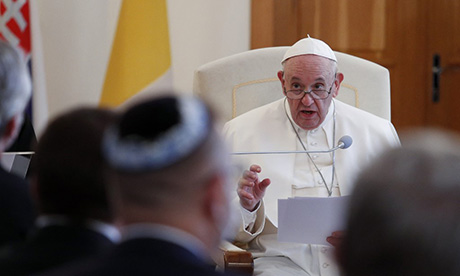Christianity is a relic that no longer neither speaks to many people nor affects the way they live their lives, Pope Francis said on Tuesday.
He made the comments to Catholic Church clergy and lay leaders in St Martin’s Cathedral, Bratislava during his pastoral visit to Slovakia.
“The centre of the Church is not the Church itself” the Pope said encouraging the leaders to avoid “self-absorption” and attempts to “make ourselves look good.”
Francis urged the leaders to foster dialogue with both believers and those who do not believe.
“How great is the beauty of a humble Church, a Church that does not stand aloof from the world, viewing life with a detached gaze, but lives her life within the world,” he said.
“Living within the world, let us not forget: sharing, walking together, welcoming people’s questions and expectations. This will help us to escape from our self-absorption, for the centre of the Church … is not the Church.”
Warning against becoming nostalgic for the past or defending Church structures, Francis “We have to leave behind undue concern for ourselves, for our structures and for what society thinks about us”.
“The Church is not a fortress, a stronghold, a lofty castle, self-sufficient and looking out upon the world below,” he said.
“Here in Bratislava, you have a castle and it is a fine one!” he exclaimed.
“The Church, though, is a community that seeks to draw people to Christ with the joy of the Gospel, not a castle!” he emphasized.
Francis said the Church throughout Europe must face the challenges in front of it and find “new languages for handing on the Gospel,” asking, “Isn’t this perhaps the most urgent task facing the Church”?
The Holy Father told the leaders that it was useless to complain and to hide behind a defensive Catholicism that blames the evil world.
Calling for creativity in name of the Gospel, Francis suggested the solution is a fine balancing act.
What the solution is not is on one hand being “content doing what we did in the past” nor on the other hand falling prey to “what the media decide we should do”.
He went on to praise a Church that leaves room “for the adventure of freedom”, rather than “becoming rigid and self-enclosed”.
“In the spiritual life and in the life of the Church, we can be tempted to seek an ersatz peace that consoles us, rather than the fire of the Gospel that unsettles and transforms us,” the pope said in Bratislava.
In concluding his address Francis encouraged the Church leaders to develop people for a mature relationship with God and not to control them too much.
“If you watch how a plant grows all the time, you kill it,” he said in an impromptu aside from his written text.
Returning to his call for creativity Francis said Catholic preachers and those responsible for pastoral care of people “can no longer enter by the usual way, let us try to open up different spaces, and experiment with other means”.
“No one should feel overwhelmed. Everyone should discover the freedom of the Gospel by gradually entering into a relationship with God, confident that they can bring their history and personal hurts into his presence without fear or pretense, without feeling the need to protect their own image.”
“A Church that has no room for the adventure of freedom, even in the spiritual life, risks becoming rigid and self-enclosed. Some people may be used to this.
“But many others — especially the younger generations — are not attracted by a faith that leaves them no interior freedom, by a Church in which all are supposed to think alike and blindly obey.”
He offered three words to help guide Catholics: freedom, creativity, and dialogue.
Then addressing the priests he urged them to “Please think of the faithful… A homily, generally, should not go beyond ten minutes… unless it is really engaging.”
Those gathered in Bratislava’s cathedral for the pope’s address vigorously applauded the remark.
